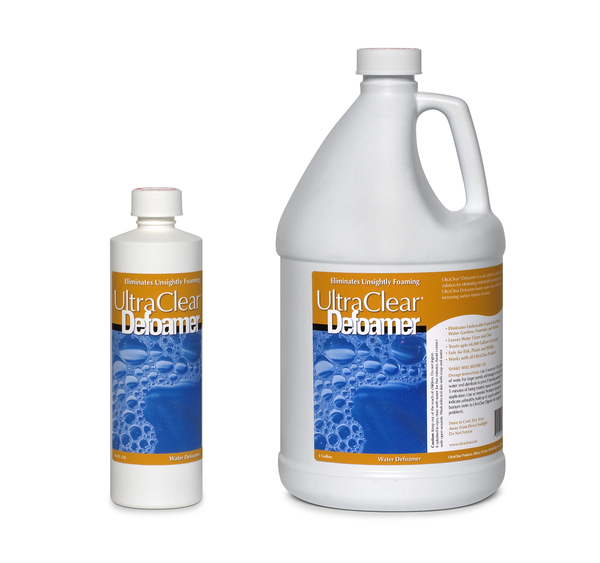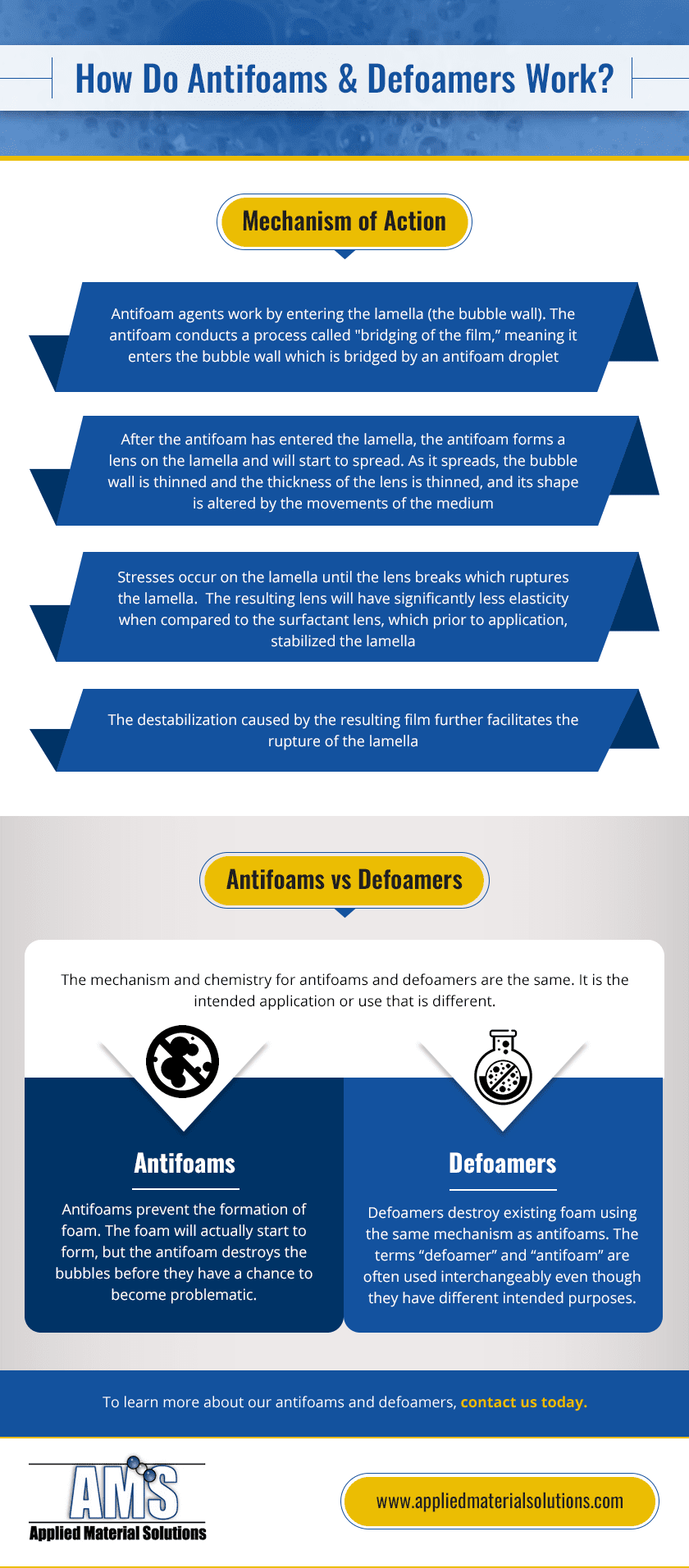Benefits of Using Defoamers to Enhance Operational Efficiency
Benefits of Using Defoamers to Enhance Operational Efficiency
Blog Article
Discover the Leading Benefits of Using Defoamers in Industrial Processes
The use of defoamers in commercial processes presents a variety of compelling advantages that can boost operational effectiveness and item top quality. By effectively controlling foam production, these agents not just maximize product flow but likewise add to substantial price decreases and boosted sustainability. The implications of adopting defoamers might be more extensive than originally perceived.
Enhanced Process Effectiveness
Enhancing industrial processes commonly entails addressing foaming issues, which can hinder functional performance. Foam development can hinder the proper performance of tools, lower the reliable use of sources, and complicate the tracking of important specifications. By carrying out defoamers, markets can efficiently mitigate these issues, bring about structured operations and improved performance.
Defoamers work by destabilizing the foam structure, permitting for quick collapse and substantial reduction in foam volume. This activity not just improves the flow of products via tools, such as activators, mixers, and pipelines, however also minimizes interruptions brought on by foam overflow. Subsequently, tools downtime is decreased, enabling an extra effective and continuous manufacturing process.
Additionally, the usage of defoamers can cause reduced power consumption. With much less foam to manage, compressors and pumps can run more successfully, leading to reduced operational costs and a general renovation in process throughput. Inevitably, the tactical usage of defoamers not only addresses immediate lathering challenges however additionally adds to an extra effective commercial ecological community, promoting an affordable benefit in a demanding market.
Improved Item Quality
The assimilation of defoamers in industrial processes plays an essential duty in improving product high quality. By effectively managing foam development, defoamers add to the consistency and uniformity of end products. Excessive foam can bring about aeration, which negatively affects the appearance and stability of formulas, specifically in sectors such as food and beverages, pharmaceuticals, and finishings.

Moreover, defoamers facilitate much better blending and dispersion of active ingredients, resulting in homogeneity in formulations. This is vital in applications where precise component ratios are critical for efficiency and security. Additionally, the removal of foam can reduce the threat of contamination during manufacturing, further securing item stability.
Inevitably, by enhancing item quality, defoamers not just enhance consumer satisfaction however also reinforce brand name reputation. Their function in keeping premium criteria underscores their value in modern industrial procedures.
Price Reduction Advantages
Implementing defoamers in industrial procedures can bring about significant expense decrease advantages. By effectively managing foam formation, defoamers decrease product loss during production, therefore maximizing material usage. This reduction in waste converts directly into reduced resources costs, improving general functional performance.
Furthermore, using defoamers can reduce power usage. Too much foam can hinder equipment performance, causing raised power needs to keep manufacturing degrees. By mitigating foam, defoamers assist in smoother procedures, permitting equipment to run extra successfully and reducing power expenses.

In addition, defoamers can shorten processing times. By making use of defoamers, markets can streamline their procedures, leading to faster turnaround times and boosted throughput.

Environmental Influence Mitigation
In industrial Learn More Here processes, making use of defoamers plays an important duty in mitigating ecological impacts connected with foam generation. Foam can cause significant functional inefficiencies, leading to raised emissions and waste generation. By efficiently regulating foam, defoamers aid maintain process effectiveness, consequently lowering the total ecological footprint of operations.
Additionally, too much foam can overflow control systems, bring about spills that might infect dirt and water sources. Defoamers assist lessen this danger by making certain that foaming does not go beyond prescribed limitations, promoting compliance with environmental policies. This positive method not only safeguards environments however likewise enhances the sustainability of industrial practices.
Furthermore, using defoamers can reduce energy usage in numerous processes. defoamers. Minimizing foam formation decreases the need for additional energy-intensive actions, such as raised anxiety or pumping, which might otherwise be needed to handle foam. As a result, the fostering of defoamers straightens with wider sustainability goals by promoting power performance while decreasing the carbon impact of commercial activities.
Inevitably, integrating defoamers right into commercial operations is a strategic procedure that supports ecological stewardship and accountable source administration.
Flexibility Throughout Industries
Across various sectors, defoamers demonstrate remarkable adaptability, adapting to the details requirements of diverse applications. In the food and drink industry, for circumstances, defoamers are critical to preserving item quality by protecting against foam development throughout processing, which can affect structure and flavor. In the pharmaceutical sector, defoamers guarantee the security of formulations, boosting product effectiveness and uniformity.
In the chemical manufacturing realm, defoamers promote smoother operations by decreasing foam in reaction vessels, hence improving yield and decreasing downtime. The paper and pulp industry counts on defoamers to improve the efficiency of pulp handling and paper production, ensuring optimal item integrity. In addition, in wastewater treatment centers, defoamers play a vital role in managing foam during aeration procedures, causing better therapy end results.
The versatility of defoamers reaches the oil and gas market, where they assist in taking care of foam in exploration liquids and manufacturing procedures. By right here customizing formulas to satisfy certain market needs, defoamers serve as important devices that improve operational effectiveness, product quality, and overall procedure performance throughout a plethora of fields. Their flexibility highlights their worth in contemporary industrial applications.
Conclusion
Finally, the utilization of defoamers in commercial processes offers many advantages, including boosted effectiveness, enhanced item high quality, significant price reductions, and favorable environmental impacts. Their capacity to successfully a knockout post control foam development contributes to functional continuity and source optimization. The convenience of defoamers throughout diverse sectors highlights their critical function in advertising sustainable techniques and success. The assimilation of defoamers represents a calculated approach to resolving challenges associated with foam monitoring in various producing settings.
Eventually, the critical use of defoamers not only addresses immediate foaming difficulties however likewise adds to an extra efficient industrial community, promoting a competitive advantage in a demanding market.
In industrial processes, the use of defoamers plays a critical role in mitigating environmental impacts associated with foam generation. By effectively controlling foam, defoamers help maintain process efficiency, thereby reducing the overall ecological impact of procedures.
Furthermore, in wastewater treatment facilities, defoamers play a vital function in managing foam during aeration processes, leading to better therapy results.

Report this page